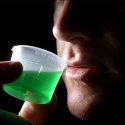Why It Is Important to Seek Alcohol Withdrawal Treatment
For those suffering from severe alcoholism, the hours following the consumption of a “last drink” are often the most dangerous time period of entering recovery. Alcohol withdrawal occurs after a heavy drinker decides to quit or significantly reduce his or her alcohol intake.
Alcohol withdrawal is unique in its severity, due to the ways in which alcohol affects the brain. Prolonged heavy consumption of alcohol will alter the brain’s chemistry, enhancing GABA receptors and decreasing the amount of glutamate activity. Because of this, a sense of euphoria and relaxation may be experienced upon consumption, however, as one progresses deeper into alcoholism, the amount of alcohol necessary to achieve a euphoric and relaxed state increases. This process is known as tolerance.
When one decides to quit drinking after a prolonged period of heavy consumption, there is a rapid rebound in the amount of GABA and glutamate activity (brain hyperexcitability), which can bring about the symptoms of alcohol withdrawal. These symptoms are different from one individual to the next and may range from mild to moderate or could be severe & pose serious threats to the user.

Alcohol withdrawal treatment can save your life!
The symptoms of alcohol withdrawal can occur as early as a couple of hours after consuming the last alcoholic beverage. Symptoms of alcohol withdrawal will fall anywhere between the mild to severe category. Individuals who may have consumed greater amounts of alcohol may experience anything between slight anxiety and shaky hands to grand mal seizures and delirium tremens. The most frightening aspect of alcohol withdrawal syndrome is that it is impossible to predict what sort of symptoms one may experience when coming off alcohol.
The best alcohol withdrawal treatment is to seek out a medically supervised detox. It is the safest environment for severe alcoholics who are taking their initial steps towards sobriety. It is important for one to be monitored by hospital staff so that they can administer appropriate medications and medical interventions as necessary. Benzodiazepines as well as Diazepam are often administered in order to combat the more severe side effects of withdrawal. Depending on the range of severity, anti-psychotics or heavy doses of B vitamins are also administered in order to combat hallucinations, which are commonly experienced when experiencing alcohol withdrawal.
Statistics show that upwards of 5% of alcoholics who suffer from alcohol withdrawal may die without appropriate medical intervention. Delirium tremens, which is characterized by high fever, irregular heartbeat and severe confusion, is the main culprit of mortality during alcohol withdrawal. Therefore, it is imperative that alcoholics seek out a safe, medically supervised, alcohol withdrawal treatment before attempting to quit on their own. For additional information on alcoholism, as well as how to locate alcohol withdrawal treatment centers, please visit the links below.
Resources:
http://findtreatment.samhsa.gov/
http://www.ncbi.nlm.nih.gov/pubmedhealth/PMH0001940/
http://www1.villanova.edu/villanova/studentlife/counselingcenter/infosheets/alcoholism.html

